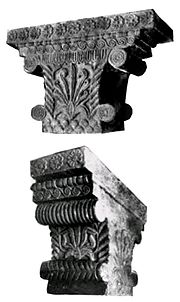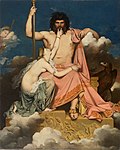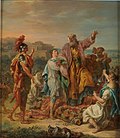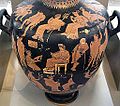The Indo-Greeks practiced numerous religions during the time they ruled in the northwestern Indian subcontinent from the 2nd century BCE to the beginning...
38 KB (4,352 words) - 00:10, 3 July 2024
Indo-Greek coins. The Kushan Empire, which succeeded the Indo-Greek Kingdom for nearly the next four hundred years, used the Greek alphabet and Greek...
81 KB (8,132 words) - 21:33, 24 October 2024
process of reconstructing Proto-Indo-European myth. Despite the popularity of Greek mythology in western culture, Greek mythology is generally seen as...
140 KB (17,130 words) - 23:38, 31 October 2024
The Indo-Greek Kingdom, also known as the Yavana Kingdom, was a Hellenistic-era Greek kingdom covering various parts of modern-day Afghanistan, Pakistan...
219 KB (25,948 words) - 09:23, 25 October 2024
Indo-Greek art Indo-Greek art is the art of the Indo-Greeks, who reigned from circa 200 BC in areas of Bactria and the Indian subcontinent. Initially...
86 KB (9,302 words) - 09:48, 18 September 2024
The legacy of the Indo-Greeks starts with the formal end of the Indo-Greek Kingdom from the 1st century, as the Greek communities of central Asia and...
44 KB (5,237 words) - 22:00, 24 June 2024
Related systems and religions European Congress of Ethnic Religions Feraferia Gaianism Greco-Buddhism Hermeticism Indo-Greek religions Kemetism List of modern...
70 KB (8,153 words) - 19:02, 30 October 2024
religions, sometimes also termed Dharmic religions or Indic religions, are the religions that originated in the Indian subcontinent. These religions,...
122 KB (13,278 words) - 15:48, 2 November 2024
Greco-Buddhism (category Indo-Greek religions and philosophy)
Greco-Buddhist Art Greco-Buddhist monasticism Indo-Greek Kingdom Manicheanism Milinda Pañha Nāgasena Religions of the Indo-Greeks Silk road transmission of Buddhism...
69 KB (7,722 words) - 18:19, 18 October 2024
modern sense. Likewise, no Greek writer known to us classifies either the gods or the cult practices into separate 'religions'. Instead, for example, Herodotus...
58 KB (7,662 words) - 16:20, 22 October 2024
by the original religion of the Indo-Iranians, infused with accretions developed locally. Michael Witzel theorises that these religions might share some...
57 KB (5,441 words) - 11:28, 17 October 2024
Canaanite religion, both Indo-European and Semitic religions influenced the ancient Greek religion, and Zoroastrianism was a product of ancient Indo-Iranian...
19 KB (2,519 words) - 22:36, 26 October 2024
Athena Alkidemos (category Indo-Greek religions and philosophy)
advancing right, with thunderbolt and shield. Menander I was the first Indo-Greek ruler to introduce the representation of Athena Alkidemos ("Athena, saviour...
1 KB (74 words) - 06:27, 18 June 2021
cultures of Eurasian Steppe. This Indo-Iranian religion borrowed "distinctive religious beliefs and practices" from the non-Indo-Aryan Bactria–Margiana culture...
80 KB (8,871 words) - 18:37, 2 November 2024
Grammar of the Indo-European, Sanskrit, Greek and Latin Languages (1874–77) represented an early attempt to reconstruct the proto-Indo-European language...
63 KB (5,751 words) - 17:24, 1 November 2024
Sky father (category Articles containing Ancient Greek (to 1453)-language text)
from the same Proto-Indo-European deity name as the Greek Zeûs Pater and Roman Jupiter, all of which are reflexes of the same Proto-Indo-European deity's...
11 KB (242 words) - 19:53, 30 October 2024
The Indo-European migrations are hypothesized migrations of peoples who spoke Proto-Indo-European (PIE) and the derived Indo-European languages, which...
267 KB (29,484 words) - 08:57, 2 November 2024
Greek (Modern Greek: Ελληνικά, romanized: Elliniká, pronounced [eliniˈka]; Ancient Greek: Ἑλληνική, romanized: Hellēnikḗ) is an Indo-European language...
68 KB (6,904 words) - 04:58, 3 November 2024
Gymnosophists (category Indo-Greek religions and philosophy)
Gymnosophists (Ancient Greek: γυμνοσοφισταί, gymnosophistaí, i.e. "naked philosophers" or "naked wise men" (from Greek γυμνός gymnós "naked" and σοφία...
18 KB (2,197 words) - 23:31, 28 October 2024
Ethnic religions (also "indigenous religions" or "ethnoreligions") are generally defined as religions which are related to a particular ethnic group (ethnoreligious...
14 KB (1,111 words) - 09:41, 4 October 2024
Kalanos (category Indo-Greek religions and philosophy)
Caranus (Ancient Greek: Κάρανος). According to the Greek sources, he did not flinch as his body burned. He bade goodbye to some of the Greek soldiers who...
15 KB (1,474 words) - 13:37, 29 October 2024
their religion is possible to reconstruct from scant Iranian, Babylonian and Greek accounts, similarities with Vedic and other Indo-European religions, and...
43 KB (6,040 words) - 03:35, 21 October 2024
Hegesias of Cyrene (category Indo-Greek religions and philosophy)
Hegesias (Greek: Ἡγησίας; fl. 290 BC) of Cyrene was a Cyrenaic philosopher. He argued that eudaimonia (happiness) is impossible to achieve, and that the...
6 KB (776 words) - 07:03, 23 October 2024
of Western Asia. Written evidence of Indo-European appeared during the Bronze Age in the form of Mycenaean Greek and the Anatolian languages of Hittite...
112 KB (10,257 words) - 12:31, 31 October 2024
Greco-Roman mysteries (redirect from Mystery religions)
Mystery religions, mystery cults, sacred mysteries or simply mysteries (Greek: μυστήρια), were religious schools of the Greco-Roman world for which participation...
29 KB (4,186 words) - 16:03, 22 October 2024
conquering territory from the Indo-Scythians and Indo-Greeks, thus transforming his kingdom into an empire. The domains of the Indo-Parthians were greatly reduced...
34 KB (3,472 words) - 04:04, 16 October 2024
Dandamis (category Indo-Greek religions and philosophy)
Dandamis (presumably Greek rendering of "Dandi-Svami") was a philosopher, swami and gymnosophist whom Alexander encountered in the woods near Taxila,...
5 KB (513 words) - 17:05, 8 September 2024
Daimon (redirect from Daimon (Greek Mythology))
of ancient Greek religion and mythology and later the daimons of Hellenistic religion and philosophy. The word is derived from Proto-Indo-European daimon...
19 KB (2,040 words) - 14:31, 21 October 2024
The pre-Greek substrate (or substratum) consists of the unknown pre-Greek languages (either Pre-Indo-European or other Indo-European languages) spoken...
43 KB (4,264 words) - 16:04, 26 October 2024
Pyrrho (category Indo-Greek religions and philosophy)
Pyrrho of Elis (/ˈpɪroʊ/; Ancient Greek: Πύρρων ὁ Ἠλεῖος, romanized: Pyrrhо̄n ho Ēleios; c. 360 – c. 270 BC) was a Greek philosopher of Classical antiquity...
20 KB (2,281 words) - 14:55, 29 October 2024
























